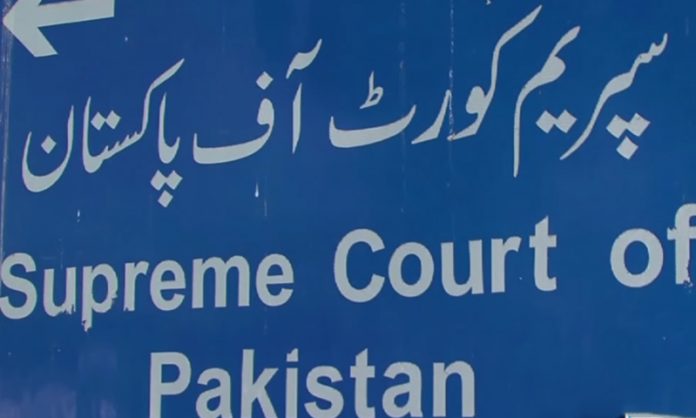ISLAMABAD: The Supreme Court is hearing the suo motu case regarding the constitutional situation in the country.
Chief Justice of Pakistan Justice Umar Ata Bandial had taken suo motu notice of the situation arisen in the National Assembly session yesterday.
Also Read:
Bilawal says Imran using foreign conspiracy to justify his coup
Shehbaz Sharif refuses to suggest name for caretaker PM
During the hearing of the case, the Chief Justice remarked that we want to hear the petitioners first and if anyone wants to give a statement, give it.
PTI lawyer Babar Awan in his arguments said that he wants to refer to the decision of the Supreme Court dated March 21, 2022. The Attorney General had assured the court that no member of the assembly would be prevented from coming.
The Chief Justice remarked that a short order had been issued yesterday and we are hearing the proceedings of the assembly yesterday.
Babar Awan prayed that the presidential reference should be heard with the suo motu notice and record my request. Imran Khan has allowed me to request that we are ready to hold elections on which Justice Umar Ata Bandial said that don’t give political statements before us.
Justice Umar Ata Bandial wrote in a written judgment that the fellow judges had approached the Chief Justice and expressed concern over the constitutional situation in the country.
During the hearing, Farooq Naik argued that the Speaker had to convene a meeting within 14 days of the motion of no-confidence motion.
On the arguments of Farooq Naik, Justice Jamal Mandokhel said that your case is related to the action of the Speaker. Can you tell me whether the Speaker did right or wrong?
Justice Muneeb remarked that there are 100 members in the assembly, 25 said that the motion should be moved and if 50 oppose then the motion would not be rejected.
Farooq Naik said that if the majority says that the motion cannot be presented then it cannot happen. The House allows the motion to be presented instead of the Speaker.
Justice Muneeb Akhtar said that the government is in the majority and if it votes against the motion, no motion will ever be moved. Does the Speaker have the power not to allow the motion to be moved? What happens if the speaker does not allow motion?
However, Justice Ijaz said that there is no no-confidence motion unless there is a Leo Grant.
The Chief Justice asked, “What does Leo mean?” What does it mean for a speaker to allow a grant?
Justice Muneeb Akhtar said that it was in the proceedings of the assembly that the Speaker could reject the resolution.
Chief Justice Umar Ata Bandial asked how the day of direct voting on the no-confidence motion could be given. In the rules, it was necessary to have a debate before voting. According to the rules, there was to be a debate for three days. How did they go to the voting without holding a debate?
Farooq Naik said that it was demanded to have a debate before voting but the Speaker did not give permission. Bilawal Bhutto also requested the Speaker.
Justice Ejaz-ul-Haq remarked that not allowing the debate to take place was a procedural defect.
Farooq H Naik read out the ruling of the Deputy Speaker in the court, to which Justice Muneeb Akhtar asked under which rule did the Speaker give the ruling? Under what rule was the no-confidence motion rejected? Can the Deputy Speaker give a ruling motion using the Speaker’s powers under Rule 28?
Farooq H Naik said that under Rule 28 of the Assembly, only the Speaker can give ruling.
Justice Muneeb Akhtar said that the ruling of the Deputy Speaker was given under which rule? In general, the Deputy Speaker used the power of the Speaker which was not the power of the Deputy Speaker. Or just the speaker? If the powers of the Speaker are different then the question of jurisdiction of the Supreme Court will arise.
Justice Muneeb Akhtar said that under Rule 28, Speaker can give the ruling himself and no one else. Under the Constitution, the Deputy Speaker can only preside over the meeting.





